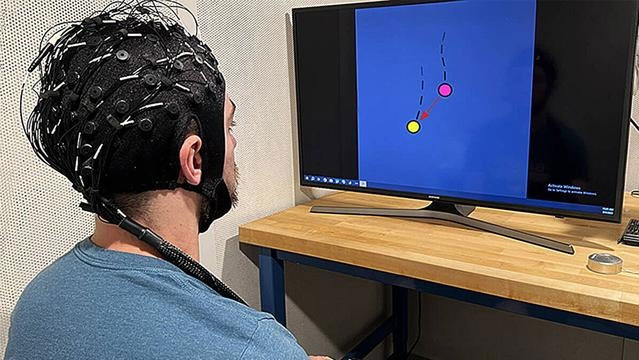Humans can control objects with their thoughts without needing a chip implanted
Researchers from Carnegie Mellon University develop a non-invasive brain-computer interface that helps people move objects with their thoughts.
Researchers from Carnegie Mellon University (USA) recently launched a chipless brain-computer interface (BCI) operated by artificial intelligence (AI) to help people move objects. follow the movement of objects on the computer screen, with only thought control.
The research team uses an automatic deep neural network powered by AI to help improve accuracy and limit confounding factors during data collection. This is also superior to conventional non-invasive BCIs used in facial recognition, voice recognition and many other simple tasks.

Test participants use their thoughts to move the object according to the movement of the virtual object. (Photo: Carnegie Mellon University).
Deep neural networks, compared to artificial neural networks (ANN) are composed of more hidden layers and nodes, and are therefore capable of handling more complex tasks, allowing BCI to extract accurate results from large and complex data sets, even when the data is noisy.
In CMU's experiment, 28 participants were able to use the thought of continuously moving objects according to objects on the screen.
Non-invasive BCIs were connected to the researchers' brains. At the same time, an electrocardiogram was used to record the participants' brain activity during the test. Data from the electrocardiogram is used to improve and automate the AI that operates deep neural networks.
The research team said that the deep neural network can immediately understand the action the user wants to do with a moving object, just by analyzing data from the BCI sensor."
Results from current studies show that in the future, automatic BCI by AI will help people control peripheral devices without using hands or mechanical movements.
This will make interacting with technology simpler, researchers will be able to observe brain activity at a much more detailed level, along with improving the lives of people with disabilities.
This is not the first time non-invasive BCI has demonstrated its potential. In 2019, in a similar way, researchers used the idea of controlling a robot arm to chase the mouse cursor.
Before non-invasive chip technology , invasive chips were led by two neurotechnology companies Neurolink and Synchro, headed by Elon Musk and Bill Gates, followed by a series of other BCI companies researching the two types of chips. invasive and less invasive. The invasive chip is implanted directly inside the brain, while the less invasive chip is placed in the skull.
The use of invasive chips raises concerns about possible damage to the brain and skull during implantation, the risk that the chip can be hacked, and the impact of the chip on brain health. in the long run, as well as manufacturers being able to take advantage of neurological data, and countless other concerns. This is where non-invasive BCI shows its outstanding advantages.
According to the research team, non-invasive BCI offers many advantages, including high safety, cost savings, and suitability for both patients and the general population, in contrast to technology developed by Neuralink and Synchron. .
"The team is testing the application of non-invasive BCI for patients with reduced motor function," said Bin He, a member of the research team and professor of biomedical engineering at CMU.
AI-powered non-invasive BCIs are believed to help improve AI devices and robotic assistants. According to Professor Bin He, "non-invasive automatic BCI technology is being tested to help control robot arms to perform complex tasks."
- Control the computer with thoughts
- The paratrooper controls the aircraft model by thought
- Korea put RFID into life
- Control others with thoughts
- Small appliances help control chronic pain
- Development of an electronic chip implanted under the skin to store Covid-19 vaccination information
- Quadriplegic patient had brain chip implanted by Neuralink to play online chess
- Scientific methods help limit negative thoughts to live better
- The world's first silicon chip can implant into the brain and dissolve itself
- Chip for the sympathetic person
- Why in Sweden, everyone implanted this chip in hand?
- Implant the subcutaneous chip instead of the password
 The US company is about to build a supersonic passenger plane of 6,000km / h
The US company is about to build a supersonic passenger plane of 6,000km / h Japan develops avatar robot as in fiction film
Japan develops avatar robot as in fiction film Australia tested the world's first mango picking robot
Australia tested the world's first mango picking robot America develops technology to separate water from animal waste
America develops technology to separate water from animal waste